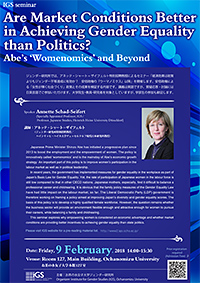 IGS seminar: Are Market Conditions Better in Achieving Gender Equality than Politics? Abe’s ‘Womenomics’ and Beyond
IGS seminar: Are Market Conditions Better in Achieving Gender Equality than Politics? Abe’s ‘Womenomics’ and Beyond
日時:2018年2月9日(金)14:00~15:30
会場:お茶の水女子大学本館127
ジェンダー研究所では、アネッテ・シャート=ザイフェルト特別招聘教授によるセミナー「経済効果は政策よりもジェンダー平等達成に有効か? 安倍政権の『ウーマノミクス』以降」を開催します。安倍政権による「女性が輝く社会づくり」政策とその成果を検証する内容です。講義は英語ですが、質疑応答・討論には日英言語でご参加いただけます。大学院生・教員・研究者を対象としていますが、学部生の参加も歓迎します。
講師:アネッテ・シャート=ザイフェルト(ジェンダー研究所特別招聘教授/ハインリッヒ・ハイネ大学デュッセルドルフ現代日本研究科教授)
Japanese Prime Minister Shinzo Abe has initiated a progressive plan since 2013 to boost the employment and the empowerment of women. The policy is innovatively called ‘womenomics’ and is the mainstay of Abe’s economic growth strategy. Evidently, the recommendations of various international economic organisations have had a significant impact on shaping Abe’s new gender policy. The World Economic Forum, the International Monetary Fund, the Organisation for Economic Co-operation and Development (OECD) and the Goldman Sachs Investment Bank are urging Japan’s public and private business organisations to reform their corporate structures in order to adapt the economic sector to the requirements of an ageing society. An important part of this policy is to improve women’s participation in the labour market as well as in political leadership.
In recent years, the government has implemented measures for gender equality in the workplace as part of Japan’s Basic Law for Gender Equality. Yet, the rate of participation of Japanese women in the labour force is still low compared to that in other OECD nations. Japanese mothers, especially, find it difficult to balance a professional career and childrearing. It is obvious that the family policy measures of the Gender Equality Law have had little impact on the labour market, so far. The Liberal Democratic Party (LDP) government is therefore working on framing a policy aimed at improving Japan’s diversity and gender equality scores. The basis of this policy is to develop a highly qualified female workforce. However, the question remains whether the business sector will provide an environment flexible enough and attractive enough for women to pursue their careers, while balancing a family and childrearing.
This seminar explores why empowering women is considered an economic advantage and whether market conditions are providing better incentives to achieving gender equality than state politics.
使用言語:英語
参加申込:Registration form 参加申込フォーム *学内向けのセミナーです。
本セミナーのPre-Reading Listです。
- Aizawa, Nobuhiro (28 September 2016): Accommodating Japan’s youth and women in a silver democracy. In: East Asia Forum.
- Dalton, Emma (2 October 2016): Japan’s new icon for gender equality. In: East Asia Forum.
- Dalton, Emma (2017): Womenomics, ‘Equality’ and Abe’s Neo-liberal Strategy to Make Japanese Women Shine: In: Social Science Japan Journal 20 (1), pp. 95–105.
- East Asia Forum (3 October 2016): Women can save Japan.
- Koshi, Naomi (2 October 2016): Can embracing diversity solve Japan’s population problems? In: East Asia Forum.
- Mackie, Vera (1 August 2016): Closing the gender gap in Japan. In: East Asia Forum.
- Macnaughtan, Helen (28 January 2015): Abe’s Womenomics needs to include men too. In: East Asia Forum.
- Macnaughtan, Helen (27 August 2015): Is Abe’s Womenomics working? In: East Asia Forum.
- Morikawa, Masayuki (1 September 2016): Japanese companies need to get women on board. In: East Asia Forum.
- Nagase, Nobuko (29 September 2016): How to make Womenomics work. In: East Asia Forum.
- Yashiro, Naohiro (22 October 2014): Why ‘Womenomics’ is the way forward for Japan. In: East Asia Forum.
上記リストの印刷物を希望の場合は、メールで連絡ください(担当:吉原 yoshihara.kumi@ocha.ac.jp)
主催: ジェンダー研究所
開催報告はこちら
